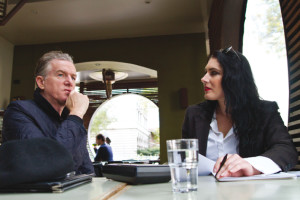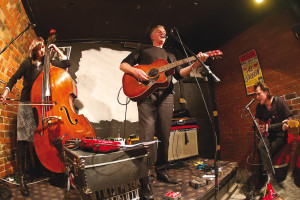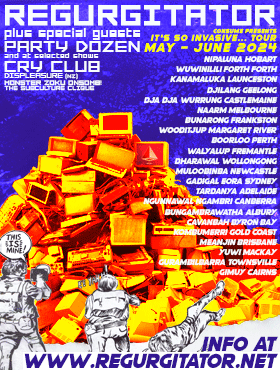MICK HARVEY
June 2011. By singer/songwriter Crystal Thomas
 A founding member of The Birthday Party and until 2009 Nick Cave and The Bad Seeds, Mick Harvey has decided after 25 years to quit his artistic and managerial role in the Bad Seeds to focus his creative energy on his solo work and his many other projects. Throughout the last 25 years Mick has also worked as a producer, released soundtrack and solo albums and appeared as a guest musician on various releases. Most recently, Mick has worked once again with PJ Harvey as co-producer on her latest album Let England Shake, and has just released his fifth solo album Sketches from the Book of the Dead. Melbourne-based artist Crystal Thomas caught up with Mick for a chat about all of the above and more.
A founding member of The Birthday Party and until 2009 Nick Cave and The Bad Seeds, Mick Harvey has decided after 25 years to quit his artistic and managerial role in the Bad Seeds to focus his creative energy on his solo work and his many other projects. Throughout the last 25 years Mick has also worked as a producer, released soundtrack and solo albums and appeared as a guest musician on various releases. Most recently, Mick has worked once again with PJ Harvey as co-producer on her latest album Let England Shake, and has just released his fifth solo album Sketches from the Book of the Dead. Melbourne-based artist Crystal Thomas caught up with Mick for a chat about all of the above and more.
I am meeting Mick today to talk to him about the writing and recording of Sketches from the Book of the Dead. This is Mick’s fifth solo release, but his first album of all original works. The album is themed around death, memory and acceptance and comprises eleven fragmented stories.
Harvey’s intentions with Sketches from the Book of the Dead is not so much to express the drama of grief and sadness but to explore “older memories, fragments of memory and the things about the imperfect nature of memory. That’s really what the album is trying to investigate in a way.”
Harvey explains that in an indirect way, the album’s more about much older, deceased people. Apart from Rowland S. Howard, it’s not really about recent events. “It’s really about things that have gone through a passage of time and that are still with you. So it’s about acceptance and about coping and being able to carry on. Perhaps it’s my age or it was just kind of where I was at, but a lot of people that had gone away were very present in my mind.” Harvey explains that it is really odd the things that continue to stay with you. “They are a whole different set of things than that relate to the kind of relationship you might have had with someone when they were around. So in a way, the fragmentary nature of that is part of what the album’s about. I think it makes it difficult for people to kind of understand some of the songs too, because they are looking for definitive statements.”

Although the songs appear to have a linear narrative structure, they are told as a way of unpacking memories to get to the feeling, and that process is something most people go through when they reminisce. “I have to actually tell the story to get to the feeling so they seem like they’re narrative songs but they’re not actually. To me they’re not typical narrative songs because they tell a very imperfect story, and just bits of it, which are really the things that come back which lead to the kind of feeling that I remember.”
Harvey muses that it is probably a difficult album, which was quite deliberate. “I don’t think it’s been a hallmark of my career that I’ve made ‘easy’ albums for people to enjoy and digest.” Harvey feels he has “done a pretty good job of it. So you know, if people don’t get it then that’s their problem,” he says, feigning a dramatic look of defiance, arms folded and smirking.
I found it refreshing that the songs were written with honesty and sincerity. Harvey doesn’t try to sugar coat the subject matter with humor or drama. “It’s a serious subject matter but it’s also one that I hope, in the end is kind of empowering. It would undermine the ideas I’m trying to get to, to make jokes and be funny. But you don’t want to be all kind of sullen or be a real downer. You don’t want to bum people out!” October Boy does have a kind of dark humor in it, which Harvey states, “is kind of a reflection of Rowland. It just made sense. It’s kind of like his humour and his tongue in cheek nature. But to kind of take some of the other songs and like you say, sugar coat them would have been a betrayal of the idea.”
Harvey recorded the album at Atlantis studio in Melbourne with Dave McCluney as his right hand man, engineering. He also recorded additional tracks at his own studio; Grace Lane Music Room. Quite a solitary process, Harvey played most of the tracks himself with three guest musicians adding colour and bottom end. Rosie Westbrook on double bass, JP Shilo on accordian and violin, and Xanthe Waite providing beautiful and haunting backing vocals.
The album is stripped back, the production kept deliberately sparse. The melodies are strong and the vocals, clear. In songs such as ‘The Ballad Of Jay Givens’ and ‘Frankie T. (Frankie C.)’ the overdubs are carefully and delicately layered with an intentional dissonance. In songs ‘October Boy’ and ‘Famous Last Words’ there is a “Wrenched and Tortured” guitar track howling and searing through the songs providing a contrast in sonic texture and emotion. ‘One Man’s Treasure’ (previous solo release) was an exercise in keeping it very simple and I think the new album is very much like that too, its really about keeping it just down to the very basic things that the songs need”
After the first listen through the album, I wondered how he felt recording his own, quite personal lyrics, how easy the recording process was in regards to vocal delivery, but Harvey had a very clear vision. “With the approach to the vocals, it was very easy for me to know how to sing these songs because I could only go to a certain point with the amount of emotional delivery in them or they would have become like a ‘version’. Like an acting kind of thing, and you know I’m very aware of the overblown nature of a lot of modern singing.”
The album was in fact an exercise in understatement. “It was like an anti-American R n B vocalization album. Some people find that difficult too, because they are so used to hearing people overblow things or exaggerate, overdramatizing the lyric.”
 Throughout the songwriting process, there were times when Harvey had to put a bit of discipline on himself to get stuck into the writing. “There were a couple of times where I sat there with the list, I just made a big list so it was like my Book of the Dead. You know, just a list of names, there were dozens, a lot more than I wrote. I thought “well, I’ve got two hours before I have to go to school (to pick up his son.) Rather than go home and just you know, do whatever, make a snack or go on the internet or something, Id say no just stay here, don’t go home now. I sat there at the kitchen table (in his studio) and just started writing anything. I just wrote some rubbish and then eventually you go ‘Oh I kinda like that actually’. Then you just start expanding on the bit that you like and what the angle is.”
Throughout the songwriting process, there were times when Harvey had to put a bit of discipline on himself to get stuck into the writing. “There were a couple of times where I sat there with the list, I just made a big list so it was like my Book of the Dead. You know, just a list of names, there were dozens, a lot more than I wrote. I thought “well, I’ve got two hours before I have to go to school (to pick up his son.) Rather than go home and just you know, do whatever, make a snack or go on the internet or something, Id say no just stay here, don’t go home now. I sat there at the kitchen table (in his studio) and just started writing anything. I just wrote some rubbish and then eventually you go ‘Oh I kinda like that actually’. Then you just start expanding on the bit that you like and what the angle is.”
Harvey strikes me as the kind of person who doesn’t really indulge in the fringe benefits and excesses that surround the Rock n’ Roll scene. I wondered whether, when The Birthday Party moved to England, Harvey played a role in keeping it together amongst the chaos? “Yeah, unintentionally. I mean I wasn’t even drinking at the time. Well, you know I probably sort of drunk at parties when I was a teenager like anybody, but I actually came out into my late teens and early twenties and just didn’t really drink. But I was a long-term smoker (cigarettes). I didn’t give up until I was 41.”
In ‘October Boy’, he sings of Rowland’s battle with addiction;
October boy, took Rock n’ Roll poison
October boy, bought into that myth
October boy, paid the price and then some
Of an experimentalist
“The I think the third verse is about his having gone down that path, he really did buy into that kind of myth about drugs being glamorous and stuff like that.
I mean they may be fun for a while, nobody argues with that, you know you can have some fun experiences, but the reality is it’s not glamorous in any way.” Harvey has noticed that “in your forties, early fifties, it catches up with people. I mean some people manage to get through it, but really a large percentage of people who have pushed it too hard have come to grief at that time and it’s a real shame.” Harvey abhors the attitude that some people have towards those who have suffered as a result of addiction and the Rock n’ Roll lifestyle. “Its not fair, you should be allowed to go crazy if you want to and it’s not like they got what they had coming or something I find that attitude detestable.”
After a small run of launch dates for his album, Harvey will be embarking on a European tour playing with PJ Harvey. He says he has quite a complicated set up for those shows. “I am mostly playing Keyboards with her so, playing an old Rhodes piano, and a drawbar organ, an Italian one. There is a Nord onstage as well that I have to use a couple of times. I’ve got a Fender Jaguar Bass for the tour specifically, because it has an ‘active switch’ which makes the pick ups active, whatever the hell that means. It goes a bit out of control. And I am still using my telecaster a bit in that show too in a couple of songs.”
For his own shows though, Harvey has a relatively simple set up. “I just use my iPhone, it’s got everything, it’s all you need! No, with my solo stuff I just use a Maton acoustic and Ive got a Cole Clark in London. I actually use a POD which is very unfashionable, because people think that they’re rubbish. I just use them for the effects stage, with the acoustic and then I split them off so I can get the direct signal and blend them, it sounds great. I use a lot of vibrato and delays and stuff out of there. I like them because they’re very easy, you don’t have to be fiddling with knobs all night in between songs. And I just got a POG (Polyphonic Octave Generator) just got one of those, I’m using that in a couple of songs, that’s really funny, it creates a high octave and a low octave and you can blend them too. So I use a POD and a POG! I still use a Fender Hot Rod Deluxe amp or a Vox AC30. I choose between those amps depending on what guitar I’m playing.” Harvey also has a fetish for Beta 57a microphones.
“I prefer that to a normal 58, I like the shape of them, they’ve got a flat front and the 58s always annoy me, the cone, you know they’re usually bashed in anyway! They’re (A Beta 57a) a bit like a Beyer-dynamic 69. It sounds like
I know my microphones, but I don’t really.”
“But the Beta 57a have a different dynamic. With a 58, if you really want to sing off them you have to get a long way back whereas the Beta 57a you don’t have to pull back as much which is a hell of a lot easier when your standing there with a guitar.” I add, “So you don’t have to leap backward when you go for those big notes?” The smirk appears again. “All those big notes I go for, yeah, my vocal gymnastics!”


